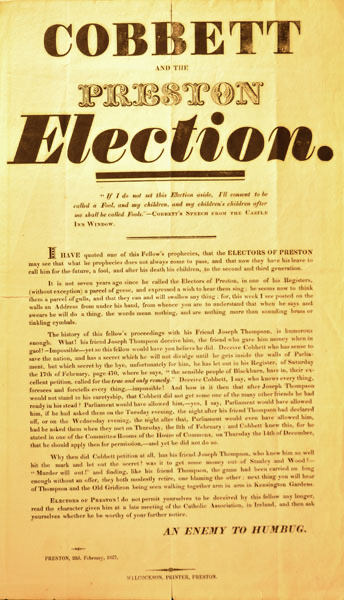
William Cobbett Part 7: Cobbett MP

For many people even getting elected to Parliament is not enough to make a name. Most MPs who are famous are famous as a result of being elected. Cobbett’s dealings with and in the House are pretty much the least interesting of his activities and among the least successful in a life already well supplied with failures.
His first attempt to get into Parliament came in 1832, when the Great Reform Act had expanded the franchise and created new opportunities for radical candidates. Cobbett stood for Manchester, one of the new industrial constituencies that should have been natural territory for someone with his background and views. Here was a man who had spent decades championing the cause of working people, criticising the establishment, and demanding democratic reform. If anyone should have benefited from the expansion of democracy, it was William Cobbett.
Instead, he managed to finish third in a two-seat constituency, behind both a Whig and a Tory candidate. The defeat was all the more humiliating because Cobbett had assumed that his decades of journalism on behalf of the working classes would automatically translate into their votes. He discovered, to his apparent amazement, that being famous for criticising the system was not the same thing as being trusted to improve it.
The problem wasn’t that Cobbett lacked support – his meetings drew large crowds and his speeches were well received. The problem was that he seemed constitutionally incapable of the kind of coalition-building that electoral success requires. Every potential ally was also a potential target for his criticism. Every compromise was a betrayal of principle. Every tactical retreat was evidence of corruption or cowardice.
Take his attitude toward the Whigs, who could have been his natural parliamentary allies. Both Cobbett and the Whigs opposed the Tories, supported parliamentary reform, and claimed to represent the interests of ordinary people against aristocratic privilege. But rather than working with the Whigs to achieve common goals, Cobbett spent most of his time attacking them for not being radical enough, for compromising with their opponents, and for lacking the courage of their convictions.
This pattern of attacking potential allies more vigorously than obvious enemies characterised Cobbett’s entire approach to politics. He seemed to reserve his greatest anger not for the Tories, who at least had the virtue of being honestly conservative, but for the moderate reformers who shared many of his goals but disagreed about tactics. In Cobbett’s mind, these people were worse than his opponents because they should have known better.
His second attempt at parliamentary success came in 1833, when he stood for Oldham, another industrial constituency where his anti-establishment message should have resonated. This time he actually won, becoming MP for Oldham at the age of seventy – a remarkable achievement for someone who had spent most of his career as a political outsider. But if his supporters hoped that electoral success might moderate his approach, they were quickly disappointed.
Cobbett’s brief parliamentary career was everything his critics had predicted and his supporters had feared. He proved utterly incapable of working within the collegial system that makes parliamentary democracy function. Where other MPs learned to build relationships, form alliances, and compromise on details whilst pursuing broader objectives, Cobbett treated Parliament as if it were his own personal newspaper, using it as a platform for lengthy speeches that convinced nobody and alienated everybody.
His maiden speech in the House of Commons perfectly encapsulated his approach to parliamentary politics. Rather than using the occasion to establish his credentials as a serious legislator, Cobbett delivered a rambling attack on the national debt, paper money, and financial corruption that lasted for several hours and sent most of his fellow MPs to sleep. The speech contained many of his familiar themes and demonstrated his characteristic passion, but it achieved nothing except to confirm his reputation as an impractical extremist.
.His attitude toward his own constituents revealed another fundamental misunderstanding of democratic politics. Cobbett seemed to believe that being elected gave him a mandate to pursue his own agenda rather than to represent his voters’ interests. When the people of Oldham disagreed with his positions or priorities, he responded not by adjusting his approach but by lecturing them about their ignorance or corruption.
The contrast with more successful radical politicians of his era is instructive. People like Joseph Hume or John Bright shared many of Cobbett’s concerns about social justice and democratic reform, but they understood that achieving these goals required patience, compromise, and coalition-building. They were willing to accept partial victories as stepping stones toward larger objectives. They cultivated relationships with potential allies, even when those allies were imperfect.
His journalistic success had convinced him that politics was simply journalism by other means – that pointing out problems and proposing solutions would naturally lead to those solutions being implemented. He failed to understand that politics is fundamentally about persuasion, negotiation, and compromise. It’s about building coalitions broad enough to actually change things, not about maintaining the purity of one’s own positions.
In our current political moment, when many voters express frustration with professional politicians and long for authentic voices who will “tell it like it is,” Cobbett’s career offers both inspiration and warning. His example shows that authenticity and independence are attractive political qualities, but also that they’re insufficient by themselves. Good intentions and correct analysis don’t automatically translate into getting anything worth doing done.
